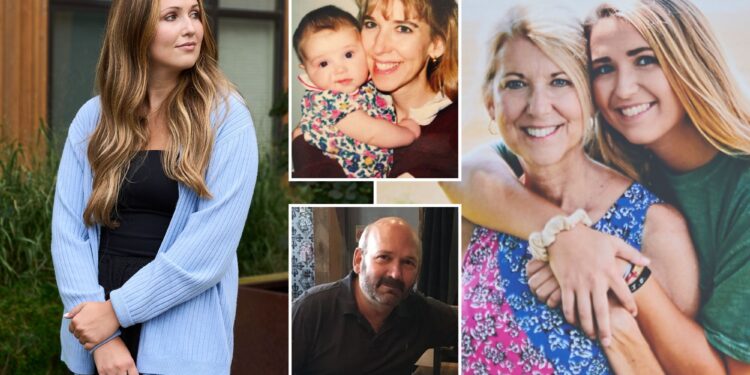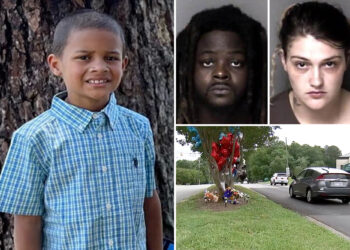
Kait Granger remembers telling her mom she loved her for the last time.
It was December 8, 2019, when Granger ran back into the apartment the two shared in Chesterfield, Missouri, a suburb outside of St. Louis, to grab a Diet Coke before her young-adult ministry internship at her church.
“I got to hug her and tell her that I love her. It was a sweet little moment,” Granger told The Post.
Later that night, her mom, Bobette Everhart-Boal, 59, went to a Christmas party. Granger woke up randomly around 2 a.m. and saw a text her father, Michael Boal, 59, had around 12:45 a.m. asking her to take care of the dog. She had a weird feeling.
“I woke up to go get my mom upstairs and she wasn’t there. I pulled up her location on my phone and saw she was in the parking lot. I said, ‘There’s no way she’s just coming home.’”
Granger opened the blinds and saw flashing lights and cop cars next to yellow crime scene tape.
“At that moment I knew what happened,” Granger said. She went outside, feeling numb and “like I was in a trance.
“I met with a cop and asked, ‘Is my mom dead?’”
While Granger slept, her father had fatally shot her mother during an argument in the parking lot of the apartment complex at around 12:45 a.m.
He then returned to the home they previously shared, some seven miles away, set it on fire and shot himself.
The estranged couple had been due in court later that week for the first meeting of their divorce proceedings. Granger says it still haunts her that her mother didn’t get the “true freedom” of the divorce she had desperately longed for before her death.
“My mom knew he was capable of really dark things,” Granger said of her father. “Even to the point where, at the end of her life, she told one of her friends that he was going to kill her. She turned to her co-worker and said, ‘Please take care of Kaitlyn.’ I was naive to think that if my mom left [him] she would be safe.”
Granger, 27, first told her story on a TikTok titled “The Story,” giving viewers a “trigger warning” before detailing the horrific crime.
“They found the murder weapon in the house in the fire,” Granger says to the camera.
“As the investigation unfolded, we learned there was a lot of premeditation. My dad opened up a storage unit four days after my mom had left back in August and started to move things from the house in there to protect them because he knew he was going to set the house on fire,” she continued, summing up the most traumatic event of her life in 4 minutes and 19 seconds.
Granger has since amassed 330,000 TikTok followers with the series “Let’s Not Rot,” which she started last yea, posting videos of herself moving through everyday tasks with voiceovers and poems she’s written about grief.
She said the videos are a commitment she made to herself and her mother to live her best life.
“I had this story inside of me I knew I needed to tell, for her and for me,” Granger told The Post. “A big aspect of this was to motivate me to do things and talk about grief in a way that is more real.”
Bobette and Michael wed in 1992 in Las Vegas. Granger was born five years later, following her brother Andrew. Michael, according to his daughter, was let go from his job at the University of Chicago Medical Center’s organ transplant team around 1998 for “ethical reasons” and the family moved to the St. Louis suburbs a couple of years later.
The Post has reached out to UChicago Medicine.
Granger, a self-described “shy kid,” said her mother experienced physical abuse at her father’s hands that was so intense that, when Granger was 3, “My mom took us kids and ran away and went and stayed with friends.”
“I don’t have a memory of my dad where I wasn’t fearful of him,” Granger said.
But they eventually returned.
“My mom kind of got trapped. She believed in the good parts of him,” Granger said. “My dad was a very charming man. He had this really manipulative pattern of being horrible and abusive to a point where she’d question everything, and then he would turn the charm on and be romantic. He hid it really well to the public, how narcissistic and mentally ill he was.”
Bobette, who worked at an interior design company in Maryland Heights, became the breadwinner for the family, Granger said. Her father, she recalled, was unemployed and “would sit at home all day.”
Granger and her brother, who she says were emotionally but not physically abused by her father, walked on eggshells.
“I didn’t see the physical abuse. But I started to see the verbal and emotional manipulation and started to question it. It really started to form who I was. I was very small, very quiet. I didn’t have a lot of friends growing up,” she said. “That made me really small as a child. My purpose was to be as agreeable and as calm and peaceful as possible, because if I was not that then my mom would get punished.”
A silver lining was playing softball, beginning at age 7 until college, because it got her and her mom out of the house.
“Softball was the greatest escape. If I’m honest, I didn’t really like the sport, but it was something that was my mom’s and mine. She would come and travel with me,” Granger recalled. ” We didn’t have a lot of money so we would travel and sit in the trunk before games and eat peanut butter sandwiches. It was really one of the only moments she felt she could be free to be who she really was.”
In August 2019, when Granger was 22 and recently graduated from Missouri State University with a psychology major, Bobette then 59, filed for divorce from Michael. She also began telling friends about the abuse, Granger said.
She moved in with Granger, but distance didn’t quiet the waves of unrest.
“It was hell in terms of the anxiety about what my dad was doing. He showed up to [Bobette’s] work to put trackers on her car and was stalking her,” she said. But inside the apartment “felt like our safe space.”
Bobette worked as wish-granter at Make-A-Wish Missouri, talking to children with terminal illnesses about their biggest dreams and helping to make them come true.
She was described as “genuine, selfless, positive and filled with light” by friends and co-workers in her obituary.
Granger recalled her mother making surreptitious trips to a friend’s house with garbage bags of clothes before she left her dad for good.
“She feared something like this would happen. We both did. She was trying to be very careful with what she did or said. She knew what she was doing was dangerous,” Granger said.
Granger immediately moved in with a family friend after Bobette was killed, unable to stay next to the scene of her mother’s death. (She married in April 2022 and is in now the process of a divorce.)
Still, she looks back fondly on her time together in that apartment, happy she was able to help her mom have even a few months of freedom from physical abuse.
“It was our first sense of home together. We went to Hobby Lobby and got one of those cheesy signs that says ‘This is our home.’ It was so meaningful because it truly was our home and our place that we could be an exist and not have to worry about laughing too loud and being able to exist as who we were,” she said “We had a couple months of bliss.
“In that home it was just peace for us.”
Now, she hopes that telling her family’s terrible story while also showing hope for the future will help others in similar situations.
“I hope I can encourage and empower other people who are experiencing similar forms of grief, fear, abuse, invalidation and domestic violence,” Granger said. “Healing comes from vulnerability and I hope that my story will inspire life-changing vulnerability from others.”



























